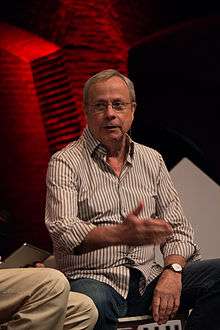David Allen (author)
David Allen (born December 28, 1945) is a productivity consultant who is best known as the creator of the time management method known as "Getting Things Done".
David Allen | |
|---|---|
 | |
| Born | December 28, 1945 |
| Occupation | Management consultant and author |
| Spouse(s) | Kathryn[1] |
| Website | gettingthingsdone |
Careers
He grew up in Shreveport, Louisiana where he acted and won a state championship in debate. He went to college at New College, now New College of Florida, in Sarasota, Florida, and completed graduate work in American history at University of California, Berkeley.[2] After graduate school, he began using heroin and was briefly institutionalized.[3] His career path has included jobs as a magician, waiter, karate teacher, landscaper, vitamin distributor, glass-blowing lathe operator, travel agent, gas station manager, U-Haul dealer, moped salesman, restaurant cook,[1] personal growth trainer, manager of a lawn service company, and manager of a travel agency. He is an ordained minister with the Movement of Spiritual Inner Awareness.[4][5] He claims to have had 35 professions before age 35.[6] He began applying his perspective on productivity with businesses in the 1980s when he was awarded a contract to design a program for executives and managers at Lockheed.
Companies founded
He is the founder of the David Allen Company, an executive coaching firm using his "Getting Things Done" methodology. David Allen Company presenters, not Allen, regularly give one-day public seminars on the methodology, and Allen himself occasionally gives lectures or sessions.
Allen was also one of the founders of Actioneer, a company specializing in productivity tools for the PalmPilot.
Publications and habitat
Allen has written three books: Getting Things Done: The Art of Stress-Free Productivity, which describes his productivity program; Ready for Anything: 52 Productivity Principles for Work and Life, a collection of newsletter articles he has written; Making It All Work: Winning at the Game of Work and Business of Life, a follow-up to his first book. In 2015 David Allen also wrote a new updated version of Getting Things Done: the Art of Stress-Free Productivity. He lived in Ojai, California with his fourth wife, Kathryn.[1] In May 2014, they moved to Amsterdam in the Netherlands.
Bibliography
- Allen, David (2001). Getting Things Done: The Art of Stress-Free Productivity. New York: Penguin Putnam. ISBN 978-0-14-200028-1.
- Allen, David (2003). Ready for Anything: 52 Productivity Principles for Work and Life. New York: Viking Books. ISBN 978-0-14-303454-4.
- Allen, David (2008). Making It All Work: Winning at the Game of Work and Business of Life. New York: Viking Adult. ISBN 978-0-67-001995-3.
- Allen, David (2015). Getting Things Done: The Art of Stress-Free Productivity (revised edition). New York: Penguin Books. ISBN 978-0-14-312656-0.
References
- Paul Keegan, June 21, 2007 How David Allen mastered getting things doneBusiness 2.0
- Keith H. Hammonds, April 30, 2000. "You can do anything – but not everything" Fast Company, retrieved April 8, 2010
- Wolf, Gary. September 25, 2007 Getting Things Done Guru David Allen and His Cult of Hyperefficiency Wired : 15.10
- Jack Coats, 2000. "David Allen – Ministering to the Business Community" The New Day Herald online retrieved January 18, 2008
- Jack Coats, 2000. "Getting Things Done: David Allen's Keys to Completion" The New Day Herald online retrieved October 24, 2007
- David E. Williams, February 9, 2007 Cutting through the clutter to get things done CNN
Further reading
- Beardsley, David. (April 1998) "Don't Manage Time, Manage Yourself." Fast Company. Issue 14, p. 64.
- Fallows, James. (July/August 2004) "Organize Your Life!." Atlantic Monthly. Vol. 294, No. 1, pp. 171–2.
- Wolf, Gary. September 25, 2007 Getting Things Done Guru David Allen and His Cult of Hyperefficiency Wired : 15.10
External links
| Wikimedia Commons has media related to David Allen. |
| Wikiquote has quotations related to: David Allen |